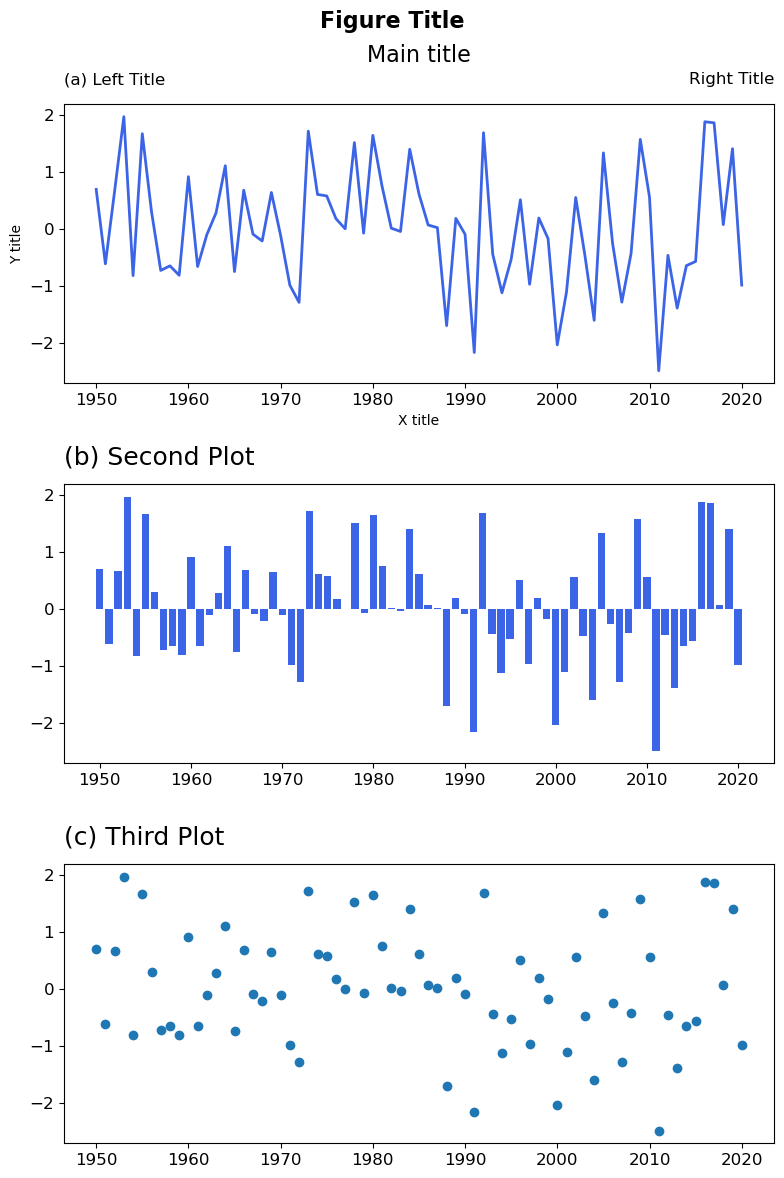General Visualization#
# --- Packages ---
## General Packages
import pandas as pd
import xarray as xr
import numpy as np
import os
import ipynbname
import cftime
## GeoCAT
import geocat.comp as gccomp
import geocat.viz as gv
import geocat.viz.util as gvutil
## Regridding and geopandas
#import xesmf as xe
#import geopandas as gpd
## Visualization
import cmaps
import cartopy.crs as ccrs
import cartopy.feature as cfeature
import shapely.geometry as sgeom
## MatPlotLib
import matplotlib.pyplot as plt
import matplotlib.ticker as mticker
import matplotlib.patches as mpatches
import matplotlib.dates as mdates
import matplotlib.patheffects as pe
from matplotlib.colors import ListedColormap, BoundaryNorm
from matplotlib.ticker import MultipleLocator
## Unique Plots
import matplotlib.gridspec as gridspec
# NCL Fonts
plt.rcParams["font.family"] = "DejaVu Sans"
plt.rcParams["font.size"] = 12
def get_filename(default="figure"):
"""Return the base filename of the current script or notebook."""
# Case 1: running from a .py file
if "__file__" in globals():
return os.path.splitext(os.path.basename(__file__))[0]
# Case 2: running inside Jupyter Notebook
try:
import ipynbname
nb_path = ipynbname.path()
return os.path.splitext(os.path.basename(str(nb_path)))[0]
except Exception:
# Fallback
return default
# --- Example usage ---
base = get_filename("template_eof_US")
fnFIG = f"{base}.png"
fnEPS = f"{base}.eps"
print(f"Figure filename: {fnFIG}")
Figure filename: template_eof_US.png
# --- DATA ANALYSIS ---
# Replace this block
ystr, yend = 1950, 2020
years = np.arange(ystr, yend + 1)
values = np.random.randn(len(years)) # or use np.random.rand() for [0, 1] range
dat = xr.DataArray(values, coords={"year": years},
dims=["year"], name="dummy data")
print(dat)
<xarray.DataArray 'dummy data' (year: 71)> Size: 568B
array([ 0.69932233, -0.6093763 , 0.67189332, 1.97906076, -0.81673206,
1.67922097, 0.30852525, -0.72564273, -0.6447174 , -0.8106967 ,
0.92338843, -0.65660246, -0.0963152 , 0.28801701, 1.1160102 ,
-0.7460441 , 0.68567217, -0.08745197, -0.2073813 , 0.64519905,
-0.11132989, -0.98549081, -1.2874477 , 1.72442407, 0.61082668,
0.58468168, 0.18478763, 0.00654854, 1.52252192, -0.06981891,
1.65067853, 0.7542871 , 0.01738674, -0.04042116, 1.40534851,
0.61962906, 0.07324505, 0.02647415, -1.696394 , 0.1893059 ,
-0.08935942, -2.16892536, 1.69673889, -0.44076272, -1.11807339,
-0.52963602, 0.51741634, -0.96915918, 0.19612623, -0.16686904,
-2.03557351, -1.103211 , 0.55669881, -0.46581984, -1.6025464 ,
1.34173298, -0.25367901, -1.28358274, -0.42832301, 1.57902386,
0.5630813 , -2.48908172, -0.46010296, -1.3882786 , -0.6416944 ,
-0.56762194, 1.88920058, 1.87062293, 0.07954066, 1.41543906,
-0.98329272])
Coordinates:
* year (year) int64 568B 1950 1951 1952 1953 1954 ... 2017 2018 2019 2020
# --- FIGURE PLOT ---
# Layout setting
fig, axes = plt.subplots(nrows=3, ncols=1, figsize=(8, 12))
col = cmaps.amwg # Use the AMWG colormap
axes = axes.flatten() # 🔑 Make it a 1D list of axes
# --- Plot 1 ---
ip = 0
axes[ip].plot(dat.year, dat, label="Label", color=col.colors[4-2], linewidth=2)
gvutil.set_titles_and_labels(axes[ip],
maintitle="Main title",
lefttitle="(a) Left Title",
righttitle="Right Title",
ylabel="Y title",
xlabel="X title",
maintitlefontsize=14, # Adjust main title font size
lefttitlefontsize=12, # Set left title font size
righttitlefontsize=12, # Set left title font size
labelfontsize=10 # Set y-label font size
)
# --- Plot 2 ---
ip = 1
axes[ip].bar(dat.year, dat, label="Label", color=col.colors[4-2], linewidth=2)
gvutil.set_titles_and_labels(axes[ip],
lefttitle="(b) Second Plot",
)
# --- Plot 3 ---
ip = 2
axes[ip].plot(dat.year, dat, marker="o", linestyle="None", markersize=6)
gvutil.set_titles_and_labels(axes[ip],
lefttitle="(c) Third Plot",
)
# Apply the overall figure title
fig.suptitle("Figure Title", fontsize=16, fontweight="bold")
# --- OUTPUT ---
plt.tight_layout()
plt.savefig(fnFIG, dpi=300, bbox_inches="tight")
plt.show()

